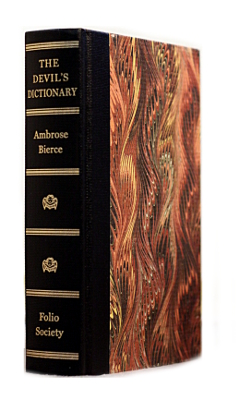About the book (from Wikipedia):
The Devil’s Dictionary is a satirical “reference” book written by Ambrose Bierce. The book offers reinterpretations of terms in the English language, lampooning cant and political doublespeak, as well as other aspects of human foolishness and frailty. It was originally published in 1906 as The Cynic’s Word Book before being retitled in 1911. Modern “unabridged” versions that include Bierce “definitions” that were for various reasons missed by earlier editions continue to be popular a century later.
Conservative
(n.) A statesman who is enamoured of existing evils, as distinguished from the Liberal, who wishes to replace them with others.
Cynic
(n.) A blackguard whose faulty vision sees things as they are, not as they ought to be. Hence the custom among the Scythians of plucking out a cynic’s eyes to improve his vision.
Faith
(n.) Belief without evidence in what is told by one who speaks without knowledge, of things without parallel.
Lawyer
(n.) One skilled in circumvention of the law.
Marriage
(n.) A household consisting of a master, a mistress, and two slaves, making in all, two.
Religion
(n.) A daughter of Hope and Fear, explaining to Ignorance the nature of the Unknowable.
About Ambrose Bierce (from Wiki):
Ambrose Gwinnett Bierce (born June 24, 1842) assumed to have died sometime after December 26, 1913) was an American editorialist, journalist, short story writer, fabulist, and satirist. He wrote the short story “An Occurrence at Owl Creek Bridge” and compiled a satirical lexicon The Devil’s Dictionary. His vehemence as a critic, his motto “Nothing matters”, and the sardonic view of human nature that informed his work, all earned him the nickname “Bitter Bierce”.
Despite his reputation as a searing critic, Bierce was known to encourage younger writers, including poet George Sterling and fiction writer W. C. Morrow. Bierce employed a distinctive style of writing, especially in his stories. His style often embraces an abrupt beginning, dark imagery, vague references to time, limited descriptions, impossible events and the theme of war.
In 1913, Bierce traveled to Mexico to gain first-hand experience of the Mexican Revolution. While traveling with rebel troops, he disappeared without a trace.


